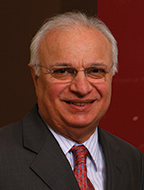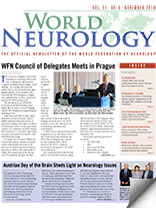
Raad Shakir, MD
By Raad Shakir, MD
The World Congress of Neurology (WCN) is the major event for a host society and is as important for the regions. There is no doubt that in each of the last four congresses the impact on the regions was positive, but to a varying degree as expected. This is one of the main reasons for holding congresses in rotation across continents.
If we start with Bangkok in 2009, the Congress was well attended and drew delegates from neighboring countries. This success resulted in the consolidation and formal establishment of the Asian Oceanian Association of Neurology (AOAN). The World Federation of Neurology (WFN) provided the AOAN with seed money to establish its legal status, produce its bylaws, and hire its own professional conference organizer. This indeed happened, and the AOAN is now a well established and financially viable association based in Singapore. This was further consolidated by their most successful subsequent Congress in Melbourne in 2012. This was made even more successful as they drew on the huge experience of the Australian and New Zealand Association of Neurology. We have to remember that Sydney hosted a successful WCN in 2005. This made the Australian neurologists experts in making congresses work. The AOAN was well organized, and the excellent Congress reinforced the status of the AOAN. Subsequent meetings in Macao and Kuala Lumpur this year continued the progress. It is clear that although the AOAN was established in 1961 with its first meeting in Tokyo, its legal status, bylaws, and financial structure only started to happen following the success of WCN Bangkok.
If we move now to WCN Marrakesh, the situation is even more spectacular. The Congress banner was “With Africa For Africa.” Prior to the WCN, the only African association was a combination of neurologists and neurosurgeons. The Pan African Association of Neurosciences (PAANS) has been in existence for nearly 40 years, but the structure and function has never been brought to the modern age. Moreover, the neurosurgeons, except a few, decided to form their own African setup and left PAANS. It was high time to organize African neurology in one solid organization with proper membership, a constitution, and bylaws as well as legal status. This aim was paramount for African neurologists who saw the Marrakesh Congress as the opportunity to establish their academy. The Moroccan society and the WFN agreed to create an Africa fund. This came from the profits of the WCN and was specifically dedicated for the establishment of an African neurology association. Although it took four years, with good will and massive organization of the head of the Africa initiative Gallo Diop, MD, PhD, of Senegal, and the WFN Regional Chair Riadh Gouider, MD, of Tunisia, it all came to fruition.
In August 2015, a meeting in Dakar of 27 African associations established the African Academy of Neurology (AFAN). The bylaws and constitution were approved, democratically elected officers were chosen, and now the organization is officially registered as a nonprofit organization in Cape Town, South Africa. The needs of Africa are massive. President Johan Aarli, MD, established the WFN Africa task force in December 2006, and we are delighted that the organization is now fully functional. The first Congress of AFAN is going to be held jointly with the Congress of the Pan Arab Union of Neurological Societies in March 2017 in Tunisia.
One might rightly think that neurology in Europe is well organized and education is advanced, which is certainly the case. However, at the time of the WCN 2013 in Vienna, there were two continental neurological organizations in deep discussions and negotiations on a merger. At the time of the WCN Vienna, one of the two regional organizations, the European Federation of Neurological Societies (EFNS) fully participated in the WCN as a partner and canceled its own Congress for that year. This resulted in consolidating the attendance for the WCN. The Austrian society worked closely with the EFNS to make the Congress a huge success. The birth of the European Academy of Neurology (EAN) followed with the merger of EFNS and the European Neurological Society. This merger started with the 2015 joint meeting in Istanbul, and the first EAN Congress was held in 2016 in Copenhagen.
Moving on to Latin America, the Santiago WCN was held in 2015. This was the second Congress in the continent following Buenos Aires in 1993, and the Chilean colleagues performed marvelously. The Congress was a success scientifically, socially, and financially. The regional association was in the process of being formed. Although neurological congresses had been held since the 1960s, they followed the same pattern as elsewhere in the world. A host country holds the Congress with the full responsibility of organization and outcome; there was no set structure and the region, although participating, did not reap the rewards of the Congress. There had been an intense discussion between Latin American neurologists over the previous four years, which culminated in a pivotal meeting during the Marrakesh Congress and proceeded to further meetings under the auspices of the WFN. These deliberations were financially supported fully by the WFN and culminated in the formation of the Pan American Federation of Neurological Societies (PAFNS). The constitution and bylaws were written, and the final step was in Santiago, when it was decided to host the PAFNS administrative office in Chile. The Chilean society agreed to offer office facilities, and the constitution and bylaws were translated into Spanish. The PAFNS is now registered as a nonprofit foundation in Chile. This will allow future developments and financial stability to disseminate neurological training in Latin America.
Again like Africa, the Santiago Congress provided financial provision for PAFNS. The WFN and Sonepsyn (Chilean Society) have given up some of their profits to facilitate the establishment of the PAFNS. This was supplemented by a grant from the American Academy of Neurology, and the three organizations are involved in providing seeding for the nascent PAFNS. It has been most heartening to see that the Mexican Academy of Neurology stepped up to host the first PAFNS Congress in October 2016 in Cancun.
All of this only demonstrates the close relationship and tight collaboration of the six WFN regional organizations in doing all they can to consolidate their status and support each other, which is the essence of regional empowerment as one of the pillars of the WFN strategy for improving neurology worldwide.
